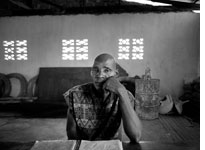Liberia Recovers From War
GBARNGA, Liberia—Shortly after I arrived in Liberia, I found myself sharing a house with a 6-year-old girl. She was the daughter of a friend's housekeeper, and she was tall for her age, with big feet, a dazzling smile, and an embrace that felt as if she'd never let go. She could sound out the words cat and apple, and she knew how to write her own name, which her family asked me not to use in print. One morning, I found her kneeling in the grass under the mango tree, gently stroking a fallen sparrow, but more often she was asked to carry water and scale fish. One of the few things my friend had told me about this girl was that she had recently been raped.
My friend worked for the United Nations. When she learned of the rape, which allegedly occurred in February, she urged the girl's mother to take the case to court. The mother wasn't sure. The man accused of raping her daughter was someone she knew. They lived in the same neighborhood, and his father had come to beg forgiveness. "In my life, since I was born, I never been to court," the girl's mother told me. "In Liberia, when you be poor, you have to settle your problem by yourself."
Liberia has parallel justice systems—one of police, courts, and prisons, and the other informal and traditional, in which guilt may be established by the physical response of the accused to a hot cutlass pressed against his flesh (if he burns, he's guilty; if not, set him free). The government and the international community are trying to rebuild the first system, which was all but destroyed by endemic corruption and more than a decade of war. The second routinely sacrifices individual justice for the sake of communal harmony. In rape cases, the perpetrator's family may offer compensation in return for forgiveness. "It's very hard when you take action," the girl's mother told me. "Some people in your community will be looking at you bad."
It's difficult to know how many women and children in Liberia have been raped, but the numbers are thought to be staggering. In 2005, the government estimated that 93.9 percent of women and girls were subjected to sexual violence during the nation's 14 years of conflict, based on surveys by the World Health Organization and others. At an event marking International Women's Day in Monrovia, someone suggested that as many as three in four Liberian women may have been raped, a figure that no expert could confirm but that no one seemed willing to deny. Rape was common during the war as a way of terrorizing and humiliating people, and violence against women is still an inescapable part of life, despite the gains made by individual women like President Ellen Johnson-Sirleaf. The streets of Monrovia, the capital, are lined with graphic signs that depict rape—a woman's dress lifted, a man kneeling between her legs, one of her sandals cast aside. The signs forbid rape, but they also define it, suggesting widespread confusion about what it means to violate a woman's body. "Maybe because of the war and protracted subjugation of women during the war, many women don't see rape as a crime," explained Izeduwa Derex-Briggs, acting program manager of the U.N. Development Fund for Women in Liberia, "and therefore they don't see the need to come out and report it."
Often, foreigners are the ones who report child rapes. At Phebe Hospital in Gbarnga, Liberia's second city, a doctor introduced me to a 12-year-old rape victim brought in by aid workers two months earlier. Her dark arms and legs were reed-thin, and her eyes slanted upward like a cat's.
In halting English, she explained how one afternoon, when she was fetching a pot to cook rice, a strange man approached her. Her mother was away farming a neighbor's land, and the girl told the man to leave her alone. He chased her, and she ran but soon fell. He stuffed a pair of trousers in her mouth and lay on top of her. "When the man finished with me, the man say, 'When you talk it, I will kill you,' " the girl said.
She got sick with a fever. Her mother thought it was malaria, but two days later, the girl broke down and told her what had happened. Her abdomen grew distended, and aid workers brought her to the hospital, where, after surgery, the wound in her stomach burst, leaving a tender pink tear that required daily dressing.
The man accused of raping the 12-year-old was being held in the local prison. Alex Flomo had a shaved head and sunken eyes. He said he was 45 and that he had paid the girl to have sex with him. "She accepted my love," he told me. "She knew about life." He meant that she was not a virgin. At first he said he didn't know her age, but he guessed that she was about 19. I told him I had seen her, and after a while, he changed his mind. Maybe she was 13. "It's just a devil the cause of this," he said.
I asked him what his punishment should be. He considered the question carefully. "After the whole case, you can put me in for a year," he said. I had asked the girl in the hospital the same question. Her eyes had been fixed on the floor, but when she heard my words, she raised them, and she answered, without hesitating, "They must kill him."
